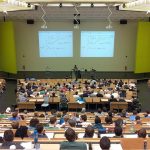Russia has set a goal to enter the top ten of the leading countries in the PISA survey. If Russia continues to strengthen its achievements with the rates that are observed from 2003 to 2015, the country can take 10th place in 5 or 6 years. Director of the Department of Education and Skills, Special Advisor on Education Policy in the Secretary General of the Organization for Economic Cooperation and Development (OECD) Andreas Schleicher spoke about the evolution of school education told about this in the interview for RIA News
– Russia has set a goal to enter the top ten of the leading countries in the PISA survey. Do you think this goal is achievable?
– Yes, I think this goal is quite real. Imagine that in 1960 in Singapore only a small proportion of residents had basic mathematical literacy and most young Singaporeans did not have access to education. Today Singapore is the leader of PISA. As the results of the latest wave of our study show, a quarter of Russian 15-year-olds are already on the same level as the leader. If Russia continues to strengthen its achievements with the rates that are observed from 2003 to 2015, the country can take 10th place in 5 or 6 years. It is important that Russian students become better able to cope with tasks in which they need to extrapolate existing knowledge and apply their creative skills in new, unfamiliar situations, be able to solve complex problems, such as those on which PISA focuses.
News
- Happy New Year! 25.12.2023
- Quasi-adaptive version of SAM tests 21.12.2023
- Using SAM to Measure Computer Literacy 19.12.2023
- Working meeting of representatives of CICED with representatives of the National Center for Assessment of the Quality of Education (NCQA) under the President of the Republic of Tajikistan” 15.12.2023
- Working meeting of representatives of CICED with representatives of the National Institute of Education of the Ministry of Education and Science of the Republic of Belarus 12.12.2023
- Working meeting of representatives of the Center for International Cooperation for the Development of Education with the Deputy Minister of Education and Science of the Kyrgyz Republic and representatives of the National Center for Assessment of the Quality of Education and Information Technologies under the Ministry of Education and Science of the Kyrgyz Republic (NTSOKOIT) 07.12.2023
- Working meeting of representatives of the Center for International Cooperation for the Development of Education with representatives of the Center for Assessment and Testing (ACT RA) under the Ministry of Education, Science, Culture and Sports of the Republic of Armenia 05.12.2023
- International cooperation of CICED in 2023 27.11.2023
- Progress on girls’ access to education: What the new UNESCO data reveals 23.10.2023
- 44 million new teachers must be recruited by 2030 to achieve our education goals 29.09.2023






